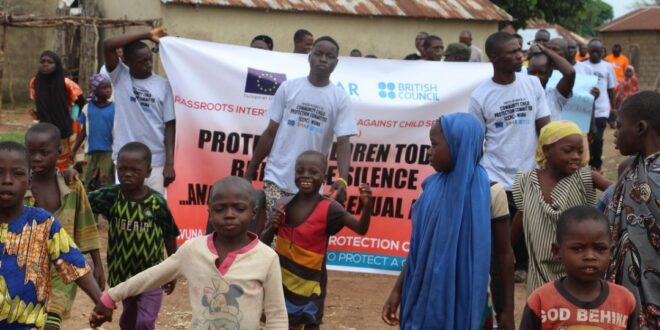In a country of 200 million, where sexual assault is described as ‘endemic’ and justice for rape victims is seldom within reach, a local community-based approach might just be the shortest cut to breaking the cycle of sexual crimes, especially in rural areas.
An air of excitement swept through Wuna village, a rural settlement in Gwagwalada area council of Nigeria’s capital territory, FCT, as the community’s chief inaugurated the Community Child Protection Committee (CCPC) – a team of young men and women vested with responsibility to monitor, investigate and report incidents of rape and sexual crimes within the area.
The 18-member team of volunteers were handpicked by the leaders of the community and the village chief bestowed on them the statutory authority to carry out the task in front of everyone.
Recent reports of rape incidents have left many Nigerians enraged over these sexual assaults, especially on children and young women.
PREMIUM TIMES has reported several rape cases across Nigeria in the past few weeks, some leading to the death of the victims.
As more Nigerians call for stiffer punishment against rapists, the Nigerian government declared a state of emergency on sexual violence while lawmakers are debating on whether to prescribe castration for persons found guilty of rape.
But despite these measures, more victims still find it difficult to get justice.
Nigeria has an extremely low conviction rate for rape and sexual abuse, despite an increase in violence against women. But the shortcomings in Nigeria’s legal system – where the burden to prove rape or abuse often lies in the evidence of it also being a violent attack – is just a tip of the challenges facing survivors.
Many more cases of rape and sexual crimes are undocumented, unheard, and unreported in rural communities such as Wuna, where lifesaving service providers such as hospitals, support centres, and the police are out of reach.
Community Based Approach
CCPC is a community-based initiative aimed at changing “norms, attitudes and behaviours of community members in Kuje, Gwagwalada and Abuja Municipal Area Council (AMAC) of the FCT, that are encouraging sexual violence of children and particularly girls while also preventing disclosures of this crime due to the culture of silence.”
It was put in place by the Sexual Offences Awareness and Response Initiative (SOAR) and Teen Support Centre, with funding from the European Union under the rule of law and anti-corruption programme.

According to SOAR, the CCPCs will have their capacities built to “promote gender equitable norms, prevent and respond to child sexual abuse and other forms of sexual and gender based violence (SGBV) and child protection issues against children.”
On Monday, during the launch of the project in Wuna, Ibrahim Ali, the CCPC secretary in the community, said he joined the committee because of his passion and love for children.
“I want children in this community to grow up in a decent way, that is why I joined,” he explained.
He said the whole community is in support of the initiative.
“Those into such crimes are the only ones that will not want something like this.”
Mr Ali, a farmer, said the only challenge is finding time to do the work while trying to concentrate on his farming.
Sunday Barnabas, the palace secretary, who is also a member of the committee, said the launch of the initiative has already started spreading fear among perpetrators of sexual crimes among the community.
“The CCPC committee makes every child and young girl protected. We have been experiencing child abuse in this community for long and nobody is talking about it, that is why we volunteered ourselves to stop these cases.
“The selected members are people of good conduct with no record of sexual crimes,” he explained.
Helen Alfred, the desk officer at the orphan and vulnerable children’s office at the Gwagwalada area council, described the initiative as a welcome development.
She explained how her office is coming into the arrangement. “We provided hot lines for the CCPC members. Once they discover a case, they are to report immediately and explain the situation even before going further into investigating.”
“Our own is to follow up with them and then keep the police on alert for possible arrest when the need arises.” she said.
How CPCCs Will Operate
Chinyere Eyoh, a rape survivor, is the founder of the SOAR initiative. She began the advocacy against sexual crimes in 2011.
“At first, we started working in schools. but then we realised that a lot of cases we handled always stem from homes in rural settings, so we decided to work with communities, so we can have more impact,” she said.
Mrs Eyoh described the CCPC, which she said was launched in 2015. as a form of police for monitoring dark corners and bringing to light hidden cases of sexual crimes.
Explaining how the CPCCs will operate, she said members are not expected to take action but to track, investigate, and report back to the appropriate authorities.
“The idea is to establish a local system in hard-to-reach communities that can track sexual violence and break the chain of silence. The most important thing is for the committee members to be dispassionate in monitoring and reporting cases without any form of bias.”

The SOAR founder also explained how the platform selects communities to establish the CCPC.
She said the community of Wuna was selected due to the high prevalence of rape, defilement and teenage pregnancy within the community.
Wuna is a predominantly Gbari-speaking village.
“Here, many teenage girls do not go to school because of early pregnancies.”
During the event, the local Wuna chief, represented by his secretary, Mr Barnabas, also listed the responsibilities of the team and how they would work.
“We know how powerful village chiefs can be, that’s why we go through them.” Mrs Eyoh said.
“We met with the Wuna chief and he bought the idea.”
She said the CCPC team in Wuna were selected by community leaders.
“After the selection, we trained them. We made them understand the different forms of abuses, because in Nigeria there are some types that are not recognised as abuse at all. Firstly, they need to understand that a child is someone below 18, and no child can consent to sexual abuse, therefore for an adult to have sexual relation with a child is an abuse.
“We also took them through some facts and myths about sexual abuse. We taught them the processes of addressing a case and how to report back to designated service providers including the police, hospitals and appropriate authorities at the Gwagwalada area council offices.”
Challenges
Just as in Wuna, the CCPC arrangement has been established in at least four other communities within the Abuja metropolis.
“The major challenge is getting community members that are committed,” Mrs Eyoh said.
“The CCPC is purely a voluntary work, members are not paid. In many communities, people are expecting to be paid before they commit themselves. It is harder to make them understand that the initiative is for the benefit of the community.

“If we can have such arrangements in as many communities as possible, sexual crimes will reduce drastically, but we can only go as far as the funds we have permits.
“Asides setting up the CCPC, we will also be working directly with the children. We are training mentors who will now meet the children once every week. to train them on how to protect and prevent themselves from being sexually abused.”
She said this will help break the cycle of silence and stigma associated with sexual abuses.
Children sexually abused often are afraid to speak up. This is why Nigerian lawmakers are seeking to amend the criminal code to eliminate a time frame for prosecuting cases of sexual abuse by increasing the period from two months to as many years as the victim decides to seek action.
 Quelins – Relationship, Sex, Marriage and Health News around the world Quelins Blog is an online magazine about relationships, love, information about marriage, partnerships and issues patterning to all that.
Quelins – Relationship, Sex, Marriage and Health News around the world Quelins Blog is an online magazine about relationships, love, information about marriage, partnerships and issues patterning to all that.




